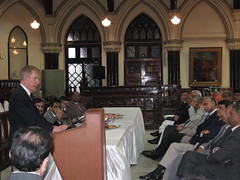 Our second day in Mumbai started out with an impromptu meeting with the director of a local NGO that works with drug users in Mumbai. The NGO runs two drop-in centers for drug users, as well as a counseling center. Those who attend the drop-in centers daily have access to counseling, recreation, opportunity to rest, and access to health care through staff members and referrals to specialized hospitals. In addition, the drop-in center runs a needle exchange program that hundreds of drug users access.
Our second day in Mumbai started out with an impromptu meeting with the director of a local NGO that works with drug users in Mumbai. The NGO runs two drop-in centers for drug users, as well as a counseling center. Those who attend the drop-in centers daily have access to counseling, recreation, opportunity to rest, and access to health care through staff members and referrals to specialized hospitals. In addition, the drop-in center runs a needle exchange program that hundreds of drug users access.The NGO also visits prisons on a near daily basis, working with those who are addicted to drugs and looking for help. They’ve created their own barracks in one of the prisons, that can hold about 35-40 people. These inmates are kept in a separate area from the general population, where severe overcrowding (sometimes upwards of 300-600 more inmates than the jail’s capacity) occurs. The NGO also focuses on HIV/AIDS education (see the pictures of some of the posters they have at their offices below).
The director gave us a glimpse of what prison conditions in Mumbai’s prisons – in particular its main prison, Arthur Road – look like. He also showed us two multimedia presentations on his organization, and even arranged for us to visit a drop-in center tomorrow, where we will have a chance to interview drug users who have recently been released from prison, and are seeking help and assistance through the NGO.
After our visit, we went down to the Fort area of Mumbai, back to the offices of our original partner organization. There we met with the director (a very high profile individual who lectures around the world, including at the HIV/AIDS Conference in Toronto in October, issues related to prisons, GLBT rights, HIV/AIDS and more). He gave us feedback on the way to go about interviewing stakeholders regarding Mumbai’s prison conditions, and also some context on the struggle for human rights within India (he mentioned a law that was recently passed that would require human rights activists to register with the government every time they held a conference, an example of the increasing bureaucratic and political struggle between activists and government officials).
 At our surprise, the director invited us to a special lecture being held that night, at the Mumbai High Court. The lecture was being given by Justice Michael Kirby, Judge of the High Court of Australia, on “The Life, Books and Legacy of H.M. Seervai.” H.M. Seervai was a legal scholar in India who wrote “Constitutional Law in India,” a book Seervai referred to as a masterpiece. Kirby was not only eloquent, but spoke with such authority on the intersection of moral ethics and the law. Kirby said that “Equal justice under the law should not just be in our courtrooms, but in our hearts and minds as well.”
At our surprise, the director invited us to a special lecture being held that night, at the Mumbai High Court. The lecture was being given by Justice Michael Kirby, Judge of the High Court of Australia, on “The Life, Books and Legacy of H.M. Seervai.” H.M. Seervai was a legal scholar in India who wrote “Constitutional Law in India,” a book Seervai referred to as a masterpiece. Kirby was not only eloquent, but spoke with such authority on the intersection of moral ethics and the law. Kirby said that “Equal justice under the law should not just be in our courtrooms, but in our hearts and minds as well.” Drawing from Justice Anthony Kennedy’s opinion on Lawrence v. Texas, Kirby urged the courts of India to strike down the country’s anti-sodomy law, quoting Kennedy: ..."times can blind us to certain truths and later generations can see that laws once thought necessary and proper in fact serve only to oppress. As the Constitution endures, persons in every generation can invoke its principles in their own search for greater freedom."
Lastly, Kirby spoke of the import of judiciary independence, stating that “A truly uncorrupted judiciary is a force…we must guard that independence with all of our power. If it is lost, it will take a long time to regain the trust of the people. We can’t trust the media and the government to do this.”
In the end, it was an impressive lecture, made even more impressive by the surroundings of the Mumbai high court, and an audience of lawyers, judges, and legal professionals from throughout Mumbai. As Justice Kirby said, “India is one of the greatest examples before the world for the future of the rule of law and the constitution on this planet.”
Afterwards we had dinner with a colleague studying for his Ph.D. in anthropology in Edinburgh (he is specifically studying the role of queer activism among the MSM community in India), and traveled back to our flat in Chembur. After a late-night team meeting, we shut the lights out near 1:00am, putting an end to a 15-hour day, and our second day in Mumbai.
